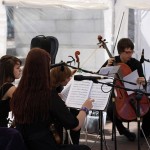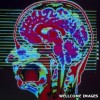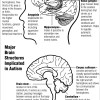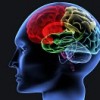Music, Education, Neuroscience
 At the recent annual meeting of the American Association for the Advancement of Science, the topics of music-education and neuroscience were highlighted by Nina Kraus, Professor of Neurobiology, Physiology and Communication Sciences at Northwestern University. In a study to be published in the April edition of Nature Neuroscience, his group demonstrated that children with some musical training were better able to distinguish sounds (in this case tonal variants of mandarin Chinese words) then their amusical peers. Specifically this study looked at distinguishing these sounds from a complicated sound background.
At the recent annual meeting of the American Association for the Advancement of Science, the topics of music-education and neuroscience were highlighted by Nina Kraus, Professor of Neurobiology, Physiology and Communication Sciences at Northwestern University. In a study to be published in the April edition of Nature Neuroscience, his group demonstrated that children with some musical training were better able to distinguish sounds (in this case tonal variants of mandarin Chinese words) then their amusical peers. Specifically this study looked at distinguishing these sounds from a complicated sound background.
While this is a very focused study, it is clear from a variety of scientific findings that music education is an essential and indispensible component of childhood education in general. Findings from Dr. Kraus’ lab have also indicated that the areas of the brain that are enhanced by musical training are the same areas found deficient in cases of dyslexia.
How many students with possible attention deficits, dyslexia, or other developmental difficulties could be helped by music education? Yet these programs are often the first to be cut when school budgets are tightened.
I’ve often wondered how professional musicians are so wonderfully educated, given the enormous amount of time they have to dedicate to their craft. But when you think about how music could help students better hear and comprehend sounds even in a complex aural environment (e.g. a classroom), it is not surprising given that in music, you are in a real sense listening to perhaps a half a dozen or more conversations or more. In an orchestra, you have to listen to yourself, your section, and all the other instruments in order to play correctly. As a skilled listener, every note is an important component of the piece, and you are easily disturbed (and perhaps later delighted) when you first listen to another recording of your favorite work to find some notes emphasized, diminished, or seemingly eliminated.
The Mozart effect (or at least the over-hyped media and commercialization of it) notwithstanding, music is more than entertaining, it can be educational.
Check out this youtube video (http://www.youtube.com/watch?v=PmWRttCo7lo ) of one of my favorite (educated) musicians, Mistko Uchida, as she explains the Schoenberg Piano Concerto (a personal favorite). I love her explanations of what you are hearing, especially at around 5:20 in this particular clip. To the uninitiated some “classical” music sounds like a jumble, but there is really so much beneath the surface. Look and listen to her play in this clip (http://www.youtube.com/watch?v=ct47T9_liOU) for a good brain workout.
| Print article | This entry was posted by Jason Williams on February 22, 2010 at 12:38 pm, and is filed under G2C Online. Follow any responses to this post through RSS 2.0. You can skip to the end and leave a response. Pinging is currently not allowed. |









